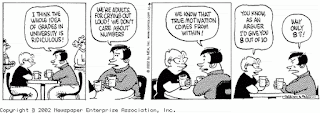Who moved my cheese?

I was reading Twitter the other daaayyy (just picture someone from Letterkenny saying this😜) and I came upon yet another discussion that basically boiled down to online (or remote) versus face-to-face. I made the mistake of reading the replies🙄. On the one hand, I was hoping that there would be a more nuanced discussion (and to be fair, I did get those types of replies from people I follow), but there were so many more about "online not being for everyone," about how people who teach face to face can "see if their points are landing and if learners are confused," or how "face to face is easier for building community" (maybe for you extroverts...🤨), or even "online works great if you love reading information off a screen and taking self-paced tests" (someone's learning like it's 1999...🤣) and other such (insert word/phrase of your choice). Obviously, the quotes are paraphrased. I became upset and irritated reading such non-sense pos...









